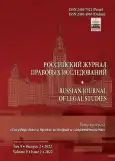Legal Mechanisms for the Protection of State Digital Sovereignty: a Comparative Legal Aspect
- Authors: Pechegin D.A.1
-
Affiliations:
- The Institute of legislation and comparative law under the government of the Russian Federation
- Issue: Vol 9, No 2 (2022)
- Pages: 9-20
- Section: Trending topic
- URL: https://journal-vniispk.ru/2410-7522/article/view/106912
- DOI: https://doi.org/10.17816/RJLS106912
- ID: 106912
Cite item
Abstract
The rapid development of digital technologies, which has become a distinctive feature of modernity, determines the vectors of the evolution of public relations and modifications of their regulators, among which both technology and law are critical. Transport, economy, manufacturing, energy, agriculture, education, healthcare, and finance are just some of the areas that, being keys for the development of modern society and the state, are subject to digital transformation. The large-scale penetration of digital technologies into the jus publicum environment is mainly owing to the effectiveness of the tools available to achieve the goals set. Digitalization tools, such as big data, machine learning, neural networks, artificial intelligence, virtual reality, the Internet of Things, and robotics, make it possible to achieve automation, such that the current state of the market is confidently predicted at the particular moment of receiving, processing, and analyzing the data. This allows a swift determination of the most effective behavior model and maximizes profits, especially in the business environment. Digital technologies are thus becoming the basis for supporting competitiveness today, not only for the business community, but more importantly, the state. However, the problem is that the digitalization of public relations covered by jus publicum and statehood today is based on solutions and algorithms that are developed and put into practice by private companies and involve the construction of service-oriented relationship architectures that exclude the independence (integrity, completeness) of the digital products (goods, services). Consequently, the risks of losing the independence and supremacy of state power increase significantly; hence, the need to find alternatives. This article is devoted to the analysis of legal mechanisms for the protection of (digital) sovereignty in a comparative legal aspect.
Full Text
##article.viewOnOriginalSite##About the authors
Denis A. Pechegin
The Institute of legislation and comparative law under the government of the Russian Federation
Author for correspondence.
Email: crim5@izak.ru
ORCID iD: 0000-0001-6499-9966
phd, senior researcher
Russian Federation, MoscowReferences
- Chursina TI, Krysenkova NB, Leschenkov FA et al. Trends of digitalization of executive power in foreign countries: a scientific and practical guide. Ed. by AN Pilipenko; Institute of Legislation and Comparative Jurisprudence under the Government of the Russian Federation. Moscow: Infotropik Media, 2021. 232 p. (In Russ.).
- Khilyuta VV. Dematerialization of the object of theft and issues of qualification of encroachments on virtual property. Journal of Russian Law. 2021;(5):68–82. (In Russ.).
- Sarkisyan T. The integration "GOELRO plan" for the XXI century. Russia in Global politics. 2021;(3):136–149. (In Russ.).
- Leontieva LS, Kudina MV, Voronov AS et al. Formation of national digital sovereignty in the conditions of differentiation of spatial development. Public administration. Electronic bulletin. February, 2021;(84):277–299. (In Russ.).
- Nikonov VA, Voronov AS, Sazhina VA et al. Digital sovereignty of the modern state: content and structural components (based on the materials of expert research). Bulletin of Tomsk State University Philosophy. Sociology. Political science. 2021;(60):206–216. (In Russ.).
- Martirosyan A. Realities of digital sovereignty in the modern world. International information security. 2021;(3):28–35. (In Russ.).
- Kashevarova YuN, Shulyatyev IA, Saifullin EK. The law of technogenic civilization: modern transformations and vectors of development: materials of the International Student Scientific and Practical Conference (Moscow, October 24, 2019). Moscow: Institute of Legislation and Comparative Jurisprudence under the Government of the Russian Federation, 2021. 222 p. (In Russ.).
- Chernogor NN, Pashentsev DA, Zaloilo MV. The concept of the digital state and the digital legal environment: monograph. Ed. by Chernogor NN, Pashentsev DA. Moscow: Institute of Legislation and Comparative Law under the Government of the Russian Federation: Norm: INFRA-M, 2021. 244 p. (In Russ.).
- Zamyshlyaev DV, Pechnikov NA. International legal regulation of the system of countering the laundering of proceeds from crime and the financing of terrorism. International public and private law. 2016;(6):25–29. (In Russ.).
- Boberakh M, Neuburger R. Zukunftspfade Digitales Deutschland 2020. HMD. 2014;(51):762–772.
- Gavrilov EO. Digital sovereignty in the context of globalization: philosophical and legal aspects. Bulletin of KemGU. Humanities and social sciences. 2020;4(2):146–152. (In Russ.).
- Meltzer PE. Preventing drugs from entering the Laundering Cycle: A Guide to the Law on Bank Secrecy. Journal of Banking Law. 1991;108(3):230–255.
- Golovanova NA, Gravina AA, Zaitsev OA et al. Criminal-jurisdictional activity in the conditions of digitalization: monograph. Moscow: Institute of Legislation and Comparative Law under the Government of the Russian Federation; LLC "LAW FIRM CONTRACT", 2019. 212 p. (In Russ.).
- Bendik A, Shturzer I. Promoting Europe's Internal and External Digital Sovereignty: The Brussels Effect and the EU-US Trade and Technology Council. SWP Comment. 2022/C20. doi: 10.18449/2022C20.
Supplementary files







